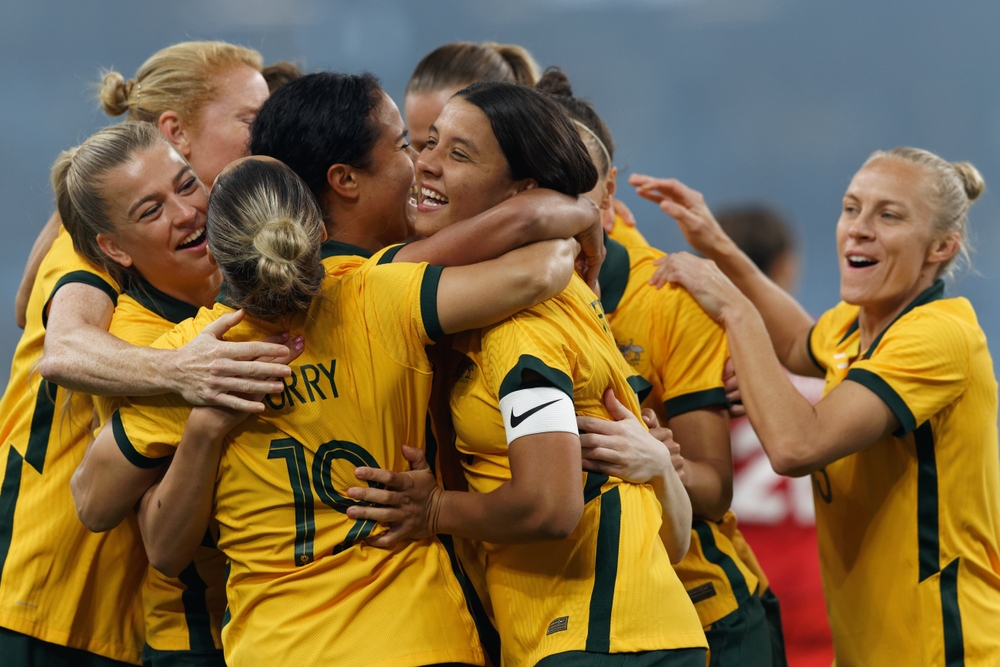After the Matildas’ heart-stopping quarter final win over France, the French coach, Herve Renard, congratulated his players, “for playing so well against an entire nation.” The Matildas at the FIFA Women’s World Cup undoubtedly garnered unifying support across the country. In doing so, Australia’s team have shattered long-held myths about a lack of consumer interest and commercial value in women’s sport. The blinding truth—how wrong they were— cannot be unseen.
Amidst sold-out stadiums, record viewership and palpable enthusiasm across the country, the 2023 FIFA Women’s World Cup can be recognised as a key moment in the history of a nation famously obsessed with sport. Beyond being a moment in history, a line in the sand has been drawn.
Over 11.15 million Australians watched the Matildas’ semi-final against England. Reports of these figures have been met with applause from all corners—politicians, corporations, media, and the public are united in recognising the significance. A wave of social media posts and articles have celebrated these formidable statistics. The resounding message: how wrong they were.
last night’s #AUSvIRL game drew 4.88 million viewers across Australia on Channel 7 alone.
that’s twice as many people that watched the #Matildas bronze medal match v Sweden at the Tokyo Olympics. unbelievable numbers.
don’t ever tell me nobody cares about women’s football!
— Samantha Lewis (@battledinosaur) July 21, 2023
If you ever hear someone say that nobody wants to watch women’s sport, show them this. pic.twitter.com/jKbyGHOl2B
— Dan Andrews (@DanielAndrewsMP) August 8, 2023
Politicians have now stepped forward with promises of additional funding for women’s sport. Business leaders are touting new sponsorship deals for women athletes. Welcome change, it appears, is here. Yet, a lasting impact is dependent upon redefining the way women’s sport is valued in Australia.
A meaningful legacy requires collective recognition of how wrong we were
The Matildas have epitomised what it is to overcome systemic barriers and to challenge archaic attitudes. The gender inequality in sport runs deep. Many of those who now offer remedies, have also been complicit in perpetuating the existing structures and beliefs.
The funding and support for women’s sport is to be applauded, but with caution. The Matildas deserve every ounce of the love and promises received. Australia is not yet worthy of the Matildas.
The legacy require investment in both in the cream and the crop
Matilda captain, Sam Kerr, has been quick to highlight the lack of funding in grassroots football for women. These deficits exist broadly in women’s sport. Balancing long-standing inequities will require addressing barriers to access and the limited participation and competition pathways.
Matilda’s goalkeeper, Mackenzie Arnold, stated “the legacy we wanted to leave throughout this World Cup, to inspire the generation coming through.” There is no doubt that the Matildas have achieved that mission; the next generation is inspired. Whether inspiration translates to a new sporting landscape will depend upon major reform.
The legacy of this World Cup reaches beyond inspiring girls’ participation in football.
Next time they’re deciding where to invest money, remind them of 10.30pm on this winter’s Monday night in Melbourne. 💙🇦🇺 #FIFAWWC pic.twitter.com/nq0uq6On7e
— Adriano Del Monte (@adriandelmonte) August 7, 2023
The Matildas have underscored the legitimacy of elite women’s sport
Historically, investment in sport has followed the idea that women’s sport lacks consumer interest and is unworthy of corporate investment. Without investment, elite female competitions have remained underdeveloped which has in turn, sustained the fallacy. Changes to government and corporate support for domestic elite competition will be critical to advancing Australian sport beyond this World Cup.
There is much work to do.
We can’t rest: #TilitsDone
- Picture at top: Australia celebrates a goal during the International Friendly Match between Australia and Canada at Allianz Stadium on September 6, 2022 in Sydney, Australia. Photo: Shutterstock
Dr Joanna Tweedie is a Post Doctoral Research Fellow at the University of Canberra Research Institute for Sport and Exercise. Joanna's research spans sport integrity, sport ethics, and sport consumer behavior.





